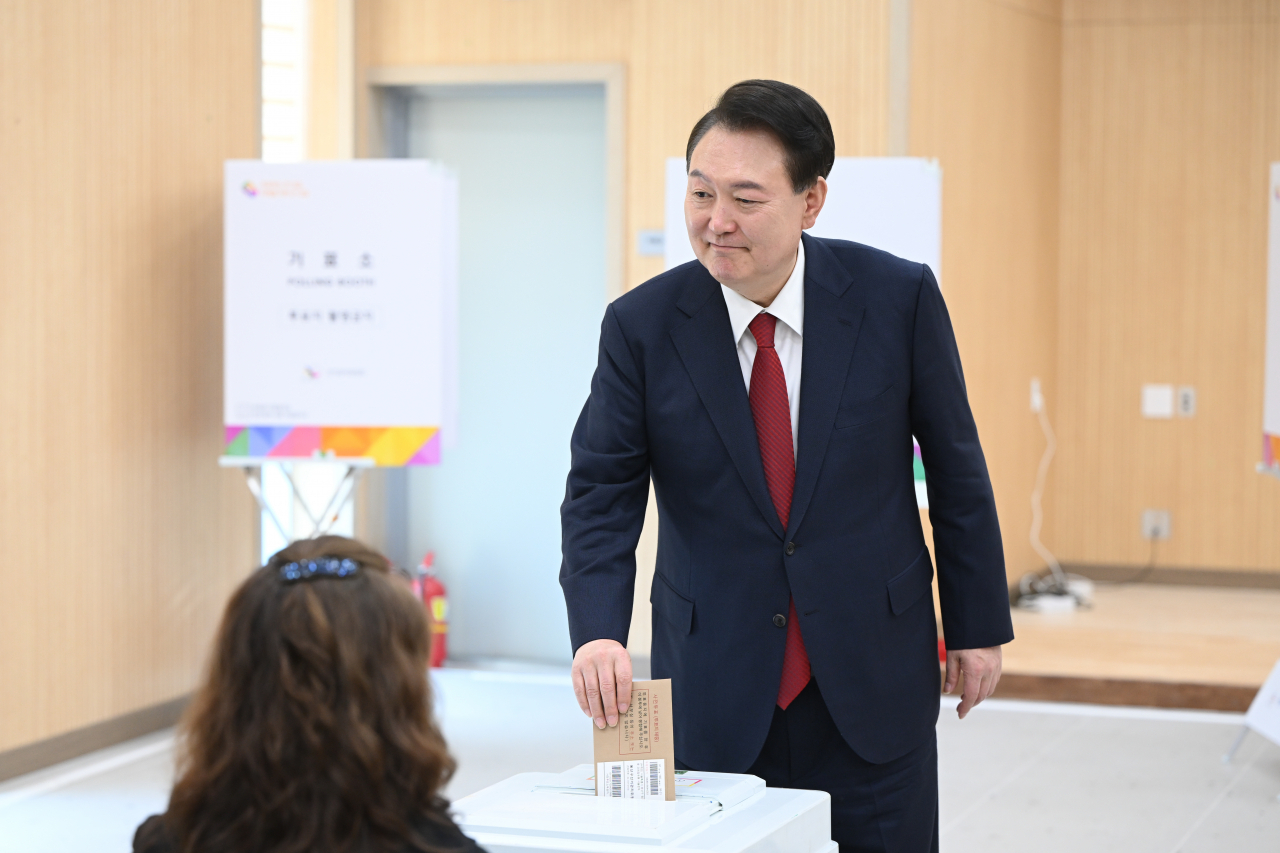 |
President Yoon Suk Yeol casts his ballot at a polling station in Busan on Friday. (Yonhap) |
More than 6.91 million South Korean voters headed to the polls as of 6 p.m. Friday to cast their ballots on the first day of the early voting for next week’s parliamentary election.
Some 15.61 percent of all 44.28 million eligible voters here had cast their votes at a total of 3,565 polling stations across the country as of 6 p.m., according to the National Election Commission.
The figure marked the highest turnout for a legislative election on the first day of early voting for the cited time period since the early voting system was adopted in 2013. It was also 3.47 percentage points higher compared to the corresponding figure during the previous 2020 general election.
In 2016, the voter turnout rate on the first day of early voting for the general election was 5.45 percent. By contrast, in the 2020 general election, the turnout rate for the first day rose to 12.14 percent.
The two-day early voting period kicked off as the main opposition Democratic Party of Korea seeks to “bring judgment” upon the Yoon Suk Yeol administration while again securing a parliamentary majority.
The Democratic Party won 180 seats in 2020, though the number fell later due to defections, by-elections and other reasons.
President Yoon Suk Yeol and his ruling conservative People Power Party aim to win back a majority in the parliament, as their failure to do so could cause Yoon to become an early lame duck. Having taken office in 2022, Yoon has three years remaining of his single five-year term.
Yoon arrived at a polling station in Busan in the morning to cast his ballot, accompanied by members of the presidential office. He later attended an opening ceremony of a new pier held in the city, where he pledged to provide tax benefits for carrier operators.
First lady Kim Keon Hee, who had accompanied her husband to a polling station in Yongsan-gu, central Seoul, during the 2022 local elections, was absent this time. Kim has remained out of the public eye since December last year, amid criticism that she was not being investigated following allegations she had breached the anti-graft law by accepting a luxury handbag from a pastor.
The leaders of the two main rival parties cast their ballots early Friday as well.
People Power Party interim leader Han Dong-hoon visited a station in Seoul’s college area of Sinchon, where he sought to lure young voters.
“We aim to carry out politics where young people can live well through great policies,” Han told reporters outside the polling station, while urging voters to cast their ballots.
Democratic Party leader Lee Jae-myung criticized the current administration’s decision to slash the country‘s research and development budget for 2024 by 15 percent from the previous year, after voting in the country’s fifth-largest city of Daejeon.
“It was incredibly ignorant (for the Yoon administration) to cut funding for research and development because they believed it was excessive,” Lee said as he voted alongside students attending the prestigious Korea Advanced Institute of Science and Technology headquartered in Daejeon.
For previous legislative elections, early voting turnout amounted to 26.7 percent of the total in 2020 and 36.8 percent in 2021.







![[Today’s K-pop] Blackpink’s Jennie, Lisa invited to Coachella as solo acts](http://res.heraldm.com/phpwas/restmb_idxmake.php?idx=644&simg=/content/image/2024/11/21/20241121050099_0.jpg)